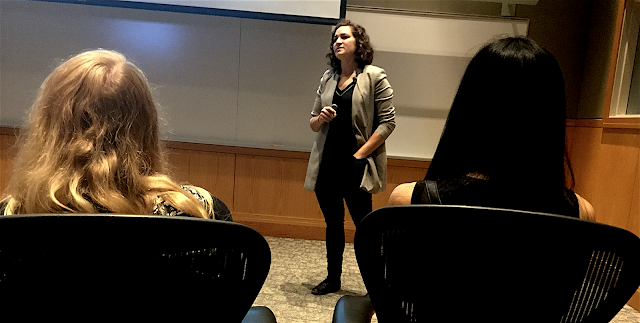 |
| Madeline Sofia speaking at the University of Minnesota |
Madeline
Sofia, associate producer on NPR's Science Desk and host the video series Maddie About Science, believes
scientists need to be better communicators.
At
a workshop on 13th September at the University of Minnesota, Sofia told
graduate students that they have the responsibility to make their science
understandable to groups like funding organizations, policy makers, and the tax
payers that fund their research.”
The
workshop, called Mind the Gap:
Becoming Better Science Communicators, was sponsored by The Center for
Cognitive Sciences and The Center for Applied and Translational Sensory Science
(CATSS), two initiatives the university has created to promote cross-discipline
research and public outreach. Her workshop was made possible the National
Science Foundation’s NRT Graduate Training Program in Sensory Science.
Personally,
the workshop was a combination of our two worlds: Blogging and reporting about ublic
media and coping with our own vision loss. We are active with CATSS as a
volunteer and project producer. You can see and hear our podcasts about CATSS here.
MEET MADDIE SOFIA
Sofia
knows the worlds of science research and academia from first-hand experience.
She has a Ph.D. in Microbiology and Immunology from the University of Rochester
Medical Center. She studied Vibrio cholerae, a 4 billion-year-old,
single-celled organism that's evolved to outsmart the human immune system.
 |
| Joe Palca & Maddie Sofia |
The
turning point for her career came when she became acquainted with NPR science
correspondent Joe Palca.
Like Sofia, Palca has his feet in both science and
media storytelling. She became a member of the online group Friends of Joe's Big Idea (FOJBI), a worldwide community of young
scientists on the way up.
The
NPR Science Desk proved to a nurturing environment for Sofia. It exposed Sofia
to a full range of scientific disciplines through the lens of a sophisticated
media environment.
Maddie About Science [link] is a special
project from Joe's Big Idea [link],
an initiative based at NPR to tell scientific stories that explore the minds
and motivations of researchers, and highlight the scientific process. The goal
of Sofia’s work is to help young scientists become better communicators.
For
the past 2+ years Sofia has been a producer on NPR's Science Desk. In addition
to her work on stories for NPR news magazines, she has produced six episodes of
Maddie About Science. Topics range from snot otters to space probes headed for
the sun.
Sofia
is the host and chief explainer in the video series. Her style is upbeat and
often hilarious. Check out her most recent module about Self-Driving cars on
the program's webpage [link].
MESSAGE FOR SCIENTISTS:
GET OUT THERE AND BE HUMAN
 |
|
“Confused
scientist” communicates
with hand shadow
puppets
|
Sofia’s
message is a mixture of technique and common sense. She told the graduate
students at the University of Minnesota to avoid only doing outreach in places
where people have already decided that science is important, like
museums.
She
told the assembled group to get out of their comfort zones and remember that
communication is two-way street.
The key is to known your audience, and tailor
the message for that group.
Sofia
urged the students to study the book Escape
from the Ivory Tower by Nancy Baron.
Baron uses the chart on the left to
make her point: Approach people, particularly media folks and policy makers, in
the opposite way that a scientist uses to communicate to other scientists.
Baron
recommends putting results and new ideas at the beginning of the piece. After
establishing the big picture, be able to answer the question So what? Talk
about how the work will benefit the public good. If necessary, be ready to
answer questions about the supporting information.
Sofia
urged the young scientists to publish outside of academic journals and use
storytelling to put science in context. She provided several communications
best practices that are helpful to everyone:
1.
Know your medium
2.
Listen more than you talk
3.
Eliminate jargon
4.
Tell a story
5.
Know your goal
6.
Be enthusiastic
7.
Practice



No comments:
Post a Comment